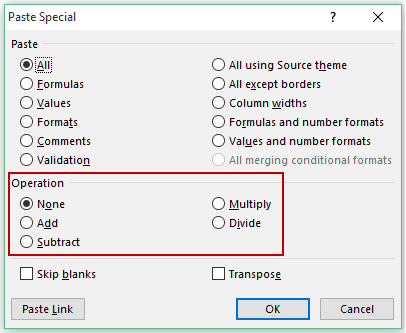-
A. arrived
-
B. have arrived
-
C. arrive
-
D. had arrived
Explanation
- Shazia had opened the door before we arrived
- شازیہ ہمارے پہنچنے سے پہلے دروازہ کھول چکی تھی۔
- **
- Arrived is best to keep the meaning of the original sentence.
- **
- past tense and past participle form is had, so we use the second form of the verb "arrived"
- **
- he/she/it arrives
- present participle arriving
- past tense arrived
- past participle arrived
- **
-
A. Binoculars
-
B. Biscut
-
C. Bisect
-
D. Benefit
Explanation
Bisect means دو ٹوک کرنا
Binoculars means دوربین
Biscuit means بسکٹ
Benefit means فائدہ
پیسٹ خصوصی ڈائیلاگ باکس میں کون سا آپشن دستیاب نہیں ہے؟
-
A. SQRT
-
B. Divide
-
C. none
-
D. Subtract
Explanation
To use options from the Paste Special box, click Home > Paste > Paste Special.

-
A. see the answer in detail
Explanation
The Ctrl+Enter+V shortcut is typically not a standard combination in most applications.
However
Ctrl+V is a keyboard shortcut used to paste information into a computer document.
It works by copying the data that has been highlighted and then pasting it into the document
-
A. The window had not been closed by me.
-
B. The window was not closed by me.
-
C. The window was not being closed by me.
-
D. No passive
Explanation
Past Perfect Tense
Active Voice Formula: Subject + had + V3+ object.
Passive Voice Formula: Object + had+ been + V3 + (By + subject)
-
A. for
-
B. about
-
C. over
-
D. of
Explanation
One day you will repent for what you have done
The word 'repent' takes the preposition 'for' after it.
'for' means with the object or purpose of.
It indicates the suiting of purpose for something
'Repeat' means to feel sorrow or regret for what one has done
so we say repeat for something.
ND11-2-2023
مجھے یاد ہے کہ میرے والد نے مجھے وہ خبر سنائی تھی۔
-
A. to tell
-
B. telling
-
C. tell
-
D. was told
Explanation
I remember my father telling me that news
مجھے یاد ہے کہ میرے والد نے مجھے وہ خبر سنائی تھی۔
-
A. None of these
-
B. She says she never saw such a beautiful sunset before.
-
C. She says that she had never seen such a beautiful sunset before.
-
D. She said that she had never seen such a beautiful sunset before.
Explanation
She said that she had never seen such a beautiful sunset before.
In indirect speech, the reporting verb "said" remains in the past tense, and the structure reflects the original past perfect tense.
This maintaining the original meaning of the statement.
-
A. He said that he had passed the examination long before.
-
B. He asked that he has passed the examination long before.
-
C. He said I passed the examination.
-
D. He said he had passed the examination long before.
Explanation
In indirect speech, we change the original sentence from "I passed the examination long ago" to "he had passed the examination long before".
Because "long ago" refers to a time in the past, which becomes "long before" in indirect speech.
Also, the pronoun "I" changes to "he" to match the subject of the sentence.
-
A. Could worked
-
B. Worked
-
C. Should work
-
D. Had worked
Explanation
If he had worked hard, he would have passed the examination.
This sentence uses the past perfect tense to express a hypothetical situation that did not occur.
✅ Correct: 0 |
❌ Wrong: 0 |
📊 Total Attempted: 0
